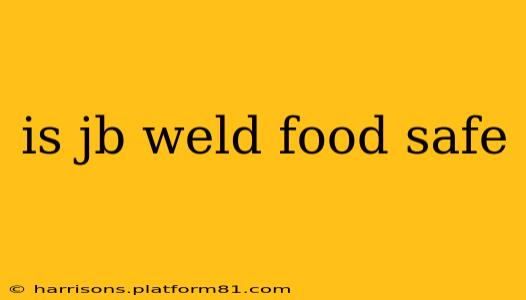JB Weld is a popular epoxy adhesive known for its incredible strength and versatility. However, a common question arises: is JB Weld food safe? The short answer is no, JB Weld is not considered food safe in its cured state. While it's incredibly durable and resistant to many substances, it's not designed for contact with food and isn't approved for food-contact applications by any major regulatory bodies. This article delves deeper into the reasons why and explores safer alternatives for food-related repairs.
Why JB Weld Isn't Food Safe
JB Weld is a two-part epoxy system consisting of a resin and a hardener. These components, along with the curing process, result in a substance that contains chemicals not intended for ingestion. While the cured epoxy might appear inert, there's always a potential for leaching of chemicals into food, especially with prolonged contact or exposure to acidic or oily substances. This leaching could pose health risks. Furthermore, the manufacturing process and potential contaminants present during production add further reasons for avoiding food contact.
What Happens if JB Weld Contacts Food?
While a small, accidental contact is unlikely to cause immediate harm, prolonged or repeated contact with food should be avoided. The potential for chemicals to leach into the food over time increases the risk of ingestion. This risk is heightened with hot foods or liquids, or foods with high acidity. Therefore, using JB Weld in any location where it might come into contact with food is strongly discouraged.
Can I use JB Weld on a cutting board?
No, you should absolutely not use JB Weld on a cutting board. Cutting boards are designed for regular contact with food, and JB Weld's chemical composition makes it unsuitable for such applications. Using it on a cutting board could result in chemical contamination of food prepared on that surface, potentially leading to health issues.
Is JB Weld safe for repairing food containers?
No. Repairing food containers with JB Weld is highly discouraged, even if the container appears to be sealed or the epoxy is only on the outside. The heat and moisture associated with food storage could affect the epoxy and lead to chemical migration. Use a dedicated food-safe adhesive specifically designed for repairing food containers.
What are some food-safe alternatives to JB Weld?
Several safer adhesives exist for food-related projects. Look for adhesives specifically labeled as food safe or approved for food contact by relevant regulatory bodies. Examples include silicone-based adhesives and certain types of epoxy designed for food-contact applications (always double-check the manufacturer's specifications).
Are there any epoxy adhesives that are food safe?
While some epoxies claim to be food-safe after curing, it's crucial to verify this claim with the manufacturer's data sheet and look for relevant certifications. Even then, exercising caution is recommended, as the potential for leaching always exists.
What should I do if JB Weld accidentally touches my food?
If JB Weld accidentally touches your food, discard the affected portion immediately. It's better to err on the side of caution and prevent any potential health risks.
In conclusion, while JB Weld boasts impressive adhesive properties, it's definitively not food safe. Prioritize using appropriate food-safe materials and adhesives for any projects involving food contact to ensure safety and avoid potential health risks. Always refer to the manufacturer's specifications and safety data sheets for any adhesive you intend to use.
